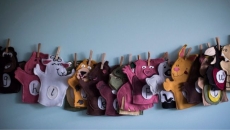Vancouver's park board says it has begun the process of closing the homeless encampment that has been in place at a local park since 2021.
The park board says it is talking directly with each of the seven people still in the camp located in the designated area at Crab Park, with the goal of closing the encampment and returning the area to "general park use" by Nov. 7.
In a statement, the park board says all seven people on site had been offered shelter previously but declined those offers, and five of the individuals had been offered housing with one person specifically already rejecting three such offers.
The statement says "ongoing non-compliance" at the encampment remains a health and safety risk, as well as an "unsustainable" strain on the park board's resources, and concern is growing as winter approaches.
The Crab Park encampment began in 2021, remaining in place in 2022 when a B.C. Supreme Court judge set aside eviction notices partially because the city didn't have enough indoor shelter spaces to accommodate those living at the camp.
In a written response, activists describe the park board's latest move as an "eviction" and criticize the city's response to the camp and its residents, including what they describe as a "callous response" during last weekend's torrential rain when residents were not allowed to erect additional tarps.
The activists also criticized the city's decision to end the encampment happening outside of the courts, where an "equal platform for a cohesive decision" could be reached.
"Both the federal Housing Advocate’s Review of Encampments and the National Protocol on Encampments stress the requirement for meaningful engagement and effective participation, for recognizing residents as rights holders and prohibiting forced eviction," the statement says.
The park board says it is "committed to supporting each person in the designated area throughout this closure," and anyone still at Crab Park after the camp closure date would still be permitted "to shelter temporarily overnight according to bylaws."
The board says the bylaw "permits overnight sheltering with structures taken down by morning."
"Given these individuals have received shelter and housing offers, there is no longer a fair and reasonable rationale for these individuals to have priority and exclusive access to daytime public park space given the other over 600 people experiencing unsheltered homelessness across the city who are required to comply with the Parks Control bylaw," the park board statement says in a background explainer of the situation.
The board says the park serves about 6,000 people within a 10-minute walk, an area with very few other green spaces nearby.
The city had previously forced people out of the encampment in March to conduct cleanup on the sites, and residents were allowed to return to the designated area at Crab Park in April.
The cleanup crew removed more than 90,000 kilograms of debris and material, 20 propane tanks and six generators during the operation.






